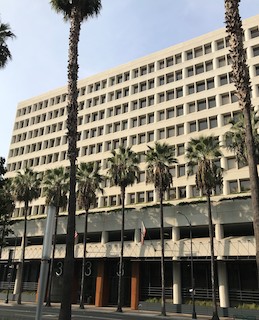In Santa Clara County Superior Court, a jury found Francisco Burgos, James Daniel Richardson and Damon Stevenson, Jr., guilty of second degree robbery (Penal Code §§ 211, 212.5(c)) and found true the gang enhancement allegation (Penal Code § 186.22(b)(1)(C)) as well as the firearm enhancement (Penal Code § 12022.53(b)), as each defendant was found to have used a firearm in committing the crime. The prosecutor also alleged that each defendant had been convicted of at least one prior serious felony offense (Penal Code §§ 667(a)), (b) – (i), 1170.12).
The trial court judge then sentenced each defendant to 21 years in state prison, which included six years for the robbery, five years for the prior serious felony conviction and ten years for the gang enhancement.
Brief Synopsis: If a person is convicted of a crime or crimes and a gang participation / promotion sentence enhancement was imposed without a bifurcated proceeding, that person can appeal the imposition of the enhancement under AB 333, as the following summary explains. In contrast to most new sentencing laws that are not retroactive to final rulings, AB 333 is retroactive to final rulings because it deals with the process and not the sentence per se.
The underlying facts alleged were that defendants were members of the Crip criminal street gang and robbed two men at gunpoint in San Jose in August 2015. One of the men robbed had no arms. The defendants took the victims’ phones and wallets after asking them where they were from and whether they “banged.”
The victims said they were from “right here” and asked defendants if they were from “Meadowfair,” a rival Norteño gang that is active in the area. The defendants said, “Well, we’re Crip.” The defendants then pulled out guns and told the victims to empty their pockets. The victim with no arms said, “Bro, I don’t even have arms. I can’t empty my pockets. You know I can’t.” The defendants then emptied his pockets. When defendants were finished, they left.
On January 1, 2022, Assembly Bill (AB) 333 became effective, substantially changing the law governing gang-related offenses. AB 333 amended Penal Code § 186.22 in several ways, requiring a stringent showing to prove a gang enhancement, and added Penal Code § 1109 to allow the defense to request a bifurcated trial on gang enhancements. Defendant’s guilt on the underlying crime must be found before trial on the gang enhancement may proceed. Penal Code §§ 1109(a)(1) and (a)(2).
 Court of Appeal Sixth Appellate District San Jose
Court of Appeal Sixth Appellate District San Jose
On appeal to the Sixth Appellate District Court in San Jose, defendants argued that they were entitled to retroactive application of AB 333 and that their gang enhancements must be vacated and the case remanded for a possible retrial in a bifurcated trial.
Defendants argued that Penal Code § 1109 applies retroactively under In re Estrada (1965) 63 Cal. 2d 740. Under Estrada, the appellate court pointed out, the question is whether the Legislature intended for the amendment to apply retroactively even without an express statement to that effect.
In its earliest applications, the Estrada rule applied to new laws that expressly reduced the punishment for an offense or eliminated criminal penalties for certain conduct. The California Supreme Court then applied the Estrada rule to a statutory amendment that merely gave trial courts the discretion to reduce an offense to a misdemeanor. People v. Francis (1969) 71 Cal. 2d 66. The Supreme Court then applied Estrada to a new law that created an affirmative defense to the transportation of marijuana. People v. Wright (2006) 40 Cal. 4th 81.
The Sixth Appellate District commented that these later cases showed that the Estrada rule may apply to a change in the law even where the defendants in question are not expressly given a lesser punishment as a result of retroactive application. More recently, the California Supreme Court has clarified the scope of the Estrada rule, expressly holding that a new statute may apply retroactively even if it concerns purely procedural changes that do not directly reduce the punishment for a crime. People v. Superior Court (Lara) (2018) 4 Cal. 5th 299, 303 (Proposition 57, prohibiting prosecutors from charging juveniles with crimes directly in adult court, applied retroactively even though it did not reduce the punishment for a crime). The Supreme Court held that Proposition 57 was retroactive because it “reduce[d] the possible punishment for a class of persons, namely juveniles.” Id.
Turning to whether AB 333 should be applied retroactively to permit retrial with a bifurcated trial, the Sixth Appellate District found it should because, first, it applies to a distinct class of defendants, those charged with gang enhancements under Penal Code § 186.22. The legislative history also showed the Legislature intended to reduce punishment specifically to those defendants of color, who overwhelmingly comprise the class of defendants charged with gang enhancements. “In Los Angeles alone, the state’s largest jurisdiction, over 98 percent of people sentenced to prison for a gang enhancement are people of color.” Assembly Bill 333, § 2(d)(4).
Accordingly, the judgments of conviction were reversed and the true findings on all gang-related allegations under Penal Code § 186.22 were vacated. The matter was remanded to the trial court for further proceedings.
The citation for the Sixth Appellate District Court ruling discussed above is People v. Francisco Burgos, et al. (6th App. Dist., 2021) 77 Cal. App. 5th 550, 292 Cal. Rptr. 3d 587.
Post Script: The Burgos ruling above was reversed on June 3, 2024 by the California Supreme Court, holding that AB 333’s / Evidence Code § 1109’s provisions to allow a bifurcated trial on gang-related issues is not retroactive, according to the Supreme Court’s interpretation of In re Estrada, supra.
For more information about Assembly Bill 333, please click on the following articles:
 Court of Appeal Sixth Appellate District San Jose
Court of Appeal Sixth Appellate District San Jose